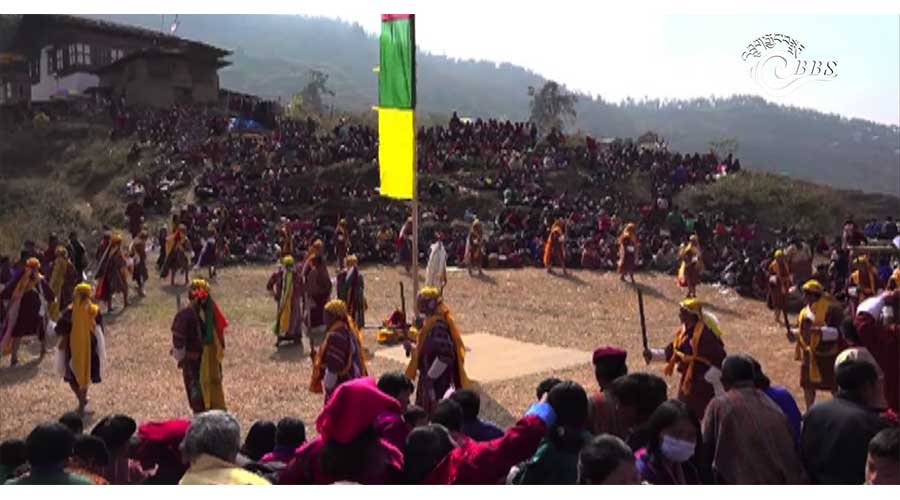
The popular Shaa-Gi Looju, a local festival at Kazhi Gewog in Wangdue Phodrang resumed this year after the regular hiatus of three years. Among the participants were many young people who are now taking on important roles in the triennial celebration. The elderly say this an encouraging sign for the community as they slowly pass the baton to the new generation of Pazaaps and dancers.
The event performed at Lengkhebji village in Lengbi Chiwog ended on Wednesday. Among the 25 Pazaaps, men dressed as traditional warriors, were many young faces.
Phub Gyeltshen, draped in his best Gho, head covered in a colourful headdress and swinging his sword in the air is performing for the first time at the festival. The 16-year-old student learnt the moves from his seniors. He says he is taking part in the celebrations because someday he will have to pass on the culture to his children. “I feel exhilarated and excited when I am dressed as a warrior and for being a part of the festival.”
He has yet to perfect his moves. Faltering and often affirming his moves with the seniors, he is, however, always ready to learn. “I have learnt a lot of things from the festival but I still have a lot of learning to do. So, I will keep learning. Moreover, I want to share about this unique culture to my friends,” he added.
Likewise, many other teenagers have also joined the festival for the first time this year.
Tashi Dorji, a 14-year-old participant said that he couldn’t take part in the festival so far as he was too young. “However, I got the opportunity this time and I found it very interesting. There is a concern that this culture could decline, as there are not many people taking interest in Pazaap. Likewise, there are also not many people having the apparels worn by a Pazaap”
Tandin Pem, another youth participants says youth participation in the event would help uphold important sociocultural values of the festival. “Our parents have preserved this unique culture so far. So, we the young ones took interest and participated this time to mainly preserve our culture and pass it down to the future generations,” she added.
As much as the youth are interested in the celebrations, the community also has a norm that mandates all households to take part in it. Likewise, the Gewog office this time also focused more on youth participation to strengthen the preservation efforts of the festival.
“We thought if our youth know about the festival well, we would be able to preserve and sustain it for years to come. Therefore, we have requested more youth to take part in the celebration even if the Looju is usually performed by a relatively young group most of the time. On top of that, we can see that the youngsters are inherently very keen about it,” shared Kazhi Gup Kinley Wangdi.
Pemba, an elderly in Lengbi Chiwog said, “There might come a time when our children don’t know the very essence of the festival, that’s why we are encouraging them to take part and they are very cooperative.”
According to the locals, Sha-Gi Looju is considered as an important event for the community. It is performed as an offering to their local deity called Phola Bji-Shi Taap, who is believed to cleanse the residents of their obstacles and misfortune. A Paw and a Neljorm-a male and a female shaman are in charge of the ritualistic proceedings.
It is also an occasion to bring the community together. Often, women are seen dressed in elaborately woven Kiras, and ornaments. Women from each household offer Zow or roasted-puffed rice to the main guest at the festival. Over the years this has evolved into the much-known “Molay Dendur’ or the beauty pageant which is actually the gathering of young women and not so much of a beauty contest.
After a day of dance and celebrations, the festival end with prayers for the well-being of the young and the old; hoping for another another three years of peace and fortune.
Changa Dorji
Edited by Kipchu


